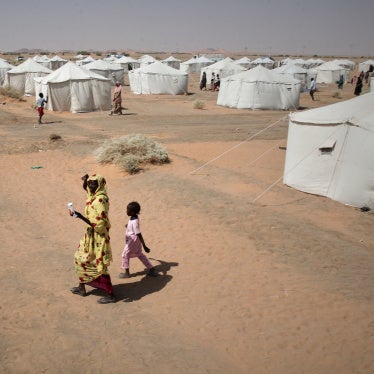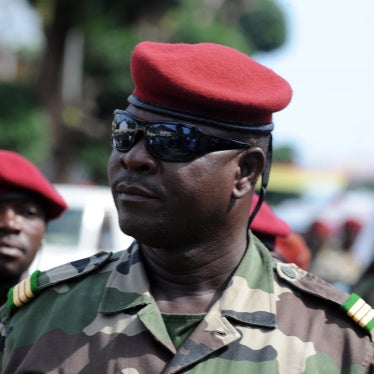November 20, 2017
Dear Minister:
We, the undersigned African and international non-governmental organizations, write to express our appreciation to African ICC states parties, many of which strongly affirmed support to the International Criminal Court during a challenging period over the past year.
We encourage your government to build on that support at the ICC’s Assembly of States Parties (ASP) sixteenth session from December 4 to 14, 2017, and the upcoming twentieth anniversary of the ICC’s Rome Statute in July 2018, to equip the ICC with adequate support to effectively deliver justice for serious crimes under international law.
The creation of the ICC in 1998 represented a profound, unprecedented shift in the fight against impunity, the securing of which African states played a crucial role.
There remains much to be done for the ICC to meet the demands for justice for widespread atrocities and the needs of victims, especially in a global landscape of an increasing number of situations where international crimes are being committed. The ability of some individuals of the most powerful states and their allies to evade the reach of the ICC remains a cause of deep concern. The ICC also needs to continue to improve its investigations and prosecutions, and efforts to make its work meaningful to local populations where the crimes were committed.
Despite these challenges, the ICC remains the only permanent court of last resort, which offers a potential check against impunity around the world when national courts fail to hold perpetrators to account. The African Union in 2014 expanded the authority of the African Court of Justice and Human Rights to include serious crimes under international law, but it is a long way off from making it operational. In addition, immunity for sitting heads of state or government and other senior state officials under the African Court’s new authority runs counter to at least two core principles of international law recognized in the Rome Statute: the irrelevance of official capacity before the court and the principle of equality of all before the law.
We believe the most effective route to enhance the ICC’s reach and practice is through strong support and meaningful engagement. Seeking universal ratification of the Rome Statute, and its incorporation into domestic legal systems, will foster the delivery of justice for serious crimes under international law at the national level, with the ICC as the essential backstop to guard against impunity.
When Burundi, Gambia, and South Africa announced their intentions to become the first states to withdraw from the court in October and November 2016, 16 African governments spoke out from their capitals, as well as in New York, Addis Ababa, and The Hague against withdrawals from the Rome Statute of the ICC and to reaffirm their support for the court. Botswana, Burkina Faso, Cape Verde, Côte d’Ivoire, Democratic Republic of Congo, Ghana, Lesotho, Liberia, Mali, Malawi, Nigeria, Senegal, Sierra Leone, Tanzania, Tunisia, and Zambia deserve praise for their public expressions of support.
In February, the new Gambian government decided to reverse plans for ICC withdrawal, and in March, South Africa abandoned domestic legislation to leave the ICC.
Only Burundi has moved forward on withdrawal, which went into effect October 27. The ICC announced on November 9 that the court on October 25 authorized under seal an investigation into alleged crimes against humanity committed in Burundi.
Going forward, robust support from African and other ICC states parties may be more important than ever. On October 26, ICC Prosecutor Fatou Bensouda announced that her office was seeking authorization from the judges to open an investigation into alleged crimes committed in Afghanistan since 2003. If authorized, the investigation could provide a long overdue path to justice, but may also potentially lead to new backlash against the ICC.
Accordingly, during the December 4 to 14 Assembly of States Parties session, we respectfully request your government to:
- Send high-level representatives to participate in the session’s general debate to signal your government’s continued backing for the ICC as the crucial court of last resort.
- Highlight in interventions throughout the session how your government cooperates with the ICC, including by adopting domestic implementing legislation for the Rome Statute; the need for the court to take additional steps to have impact with the communities most affected by the crimes; and the importance of the court having sufficient resources to implement its mandate.
- Raise areas where improvements are needed to support the effective exercise of the ICC’s mandate, while also expressing full support for the ICC’s judicial and prosecutorial independence.
- Support the ICC having adequate resources to fulfill its mandate, and satisfy your government’s financial commitments to the court as a demonstration of support for the court.
- Support the election of the most highly qualified candidates to fill the six judicial vacancies.
- Use the plenary session on the twentieth anniversary of the Rome Statute to identify steps your government will take to demonstrate its support for the court around the anniversary.
In addition, we encourage your government to take advantage of the months leading up to the Rome Statute’s twentieth anniversary on July 17, 2018 to:
- Continue to expressly support the work and mandate of the ICC in high-level bilateral and multilateral meetings.
- Convene ministerial conferences on the Rome Statute and the ICC nationally and sub-regionally.
- Implement the Rome Statute domestically, if not yet done, and promote greater cooperation with the court by concluding cooperation agreements.
Finally, we respectfully ask your government to consider for the next African Union summit to:
- Revisit the request for the ICC to establish a Liaison Office at the headquarters of the African Union in Addis Ababa, which would help improve communication and understanding between the ICC and the AU.
- Propose that the AU drop its call for the Rome Statute to be amended to include immunity for sitting leaders. Such immunity should also be removed from the proposed expansion of the African Court of Justice and Human Rights.
- Request that the ICC withdrawal strategy, adopted with reservations by African ICC states parties in January 2017, be suspended.
African ICC states parties played an important role in supporting justice for victims over the past year. We stand ready to support your government in further advancing the cause of justice for serious crimes under international law and appreciate your consideration of this letter.
Sincerely,
African Centre for Justice and Peace Studies (Uganda)
Africa Center for International Law and Accountability (Ghana)
Africa Legal Aid
Centre for Accountability and the Rule of Law (Sierra Leone)
Centre for Human Rights and Rehabilitation (Malawi)
Children Education Society (Tanzania)
Club des Amis du Droit du Congo (Democratic Republic of Congo (DRC))
Coalition Burundaise pour la Cour Pénale Internationale
Coalition Centrafricaine pour la Cour Pénale Internationale
Coalition for the International Criminal Court (Global)
Coalition Ivoirienne pour la Cour Pénale Internationale
Coalition Malienne pour la Cour Pénale Internationale
Forum pour le Renforcement de la Société Civile (Burundi)
Ghana Center for Democratic Development
Human Rights Watch
International Crime in Africa Programme, Institute for Security Studies (South Africa)
International Commission of Jurists (Global)
International Commission of Jurists – Kenya Section
International Federation for Human Rights
Kenya Human Rights Commission
L’Observatoire Centrafricain des Droits de l’Homme
Ligue pour la Paix, les Droits de l’Homme et la Justice (DRC)
Les Mêmes Droits pour Tous (Guinea)
Organisation Guinéenne de Défense des Droits de l’Homme et du Citoyen
Nigeria Coalition for the International Criminal Court
Parliamentarians for Global Action
Réseau des Citoyens Probes (Burundi)
Réseau Equitas Côte d’Ivoire
Southern Africa Litigation Centre (South Africa)
Southern Africa Centre for the Constructive Resolution of Disputes (Zambia)








